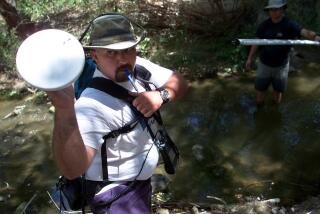Earth Could Use Friends Like Abbey
- Share via
MEXICAN HAT, Utah — This is Abbey country. And Ed is on my mind.
Edward Abbey died 13 years ago this spring. It’s no coincidence that since his passing, the American conservation movement lost some of its grit.
During Abbey’s lifetime, environmentalism was an ideal broadly claimed, including by many who had no right to.
Today, environmentalists are a special-interest group. The very word “environmentalism” has, by the repetitious accusation of its enemies and the aloofness of its friends, come to signify class and culture conflict.
Too often, we permit the phrase “opposition by environmentalists” to signify a regressive, not progressive, stance in our civic conversations.
Looking back, Abbey was the foremost conservationist writer/philosopher of his age. He was a desert rat and a Westerner.
As I hike through these mysterious rock lands he called home, I ponder his lesson: Living in harmony with our surroundings is not an elitist idea.
“If America could be, once again, a nation of self-reliant farmers, craftsmen, hunters, ranchers and artists, then the rich would have little power to dominate others. Neither to serve nor rule: That was the American dream,” he wrote in his journal.
Unfortunately, environmentalists count among their bitterest foes most of those groups Abbey listed.
Abbey accomplished two things in his soaring personal encounters with the Southwest and open spaces: His books such as “Desert Solitaire” and “Down the River,” along with his rompish novel “Monkey Wrench Gang” raised our consciousness and challenged our consciences about our diminishing frontier and the misguided tunnel vision of those who plunder resources without regard to sustainability. And more important, he made his case, not for the sake of the environment, but on behalf of humankind.
Nature, he frequently wrote, would correct its own imbalances over time. The things he hated, like Glen Canyon Dam, would ultimately perish. But would people survive to celebrate the day? Would they be happy and free along the way?
In other words, Abbey was a humanist. His wit and his gusto for living were unbounded. He made conservation joyous.
No one has filled his shoes, and too few have tried.
As a consequence, the environmental movement has drifted away from humanism. There are the die-hards who call Abbey their inspiration. And for them, omitting those drawn to eco-terrorism, we can be thankful. We need people willing to commit wholly. But other environmentalists have become too much like a clique, too narrow, too stern, too effete, too urban.
How ironic: Two people who drive a VW and seek peace and quiet on a hike are accused of being “elitists” by the pair who drive a 15-ton RV with satellite dish, air-conditioning, whirlpool spa and a brace of off-road vehicles in tow.
Through their organizations, environmentalists have the attitude of furrowed-brow bureaucrats. They “work the system,” they do not change it. Too many facts, not enough soul. Their loudest arguments are not always the right arguments. They are celebrity-struck. And they are glum.
They see themselves as selfless but are often seen as selfish.
I am one of them. I have made all those mistakes.
That’s why I’m thankful for Ed.
He gave us words to live by: “Orthodoxy is a relaxation of the mind accompanied by a stiffening of the heart.”
Edward Abbey was contradictory, xenophobic and polemical. May we forgive him these flaws. That’s because Abbey’s exuberant defense of freedom, the freedom to enjoy life, was more lasting than his failings. Read Abbey and you’ll realize why we use the word “nature” when we speak of our “human nature.” He reminded us that saying “no” was not enough.
He was a populist, that kind of elitist we can trust. In this crowded world, he inspired us to say “yes.” There is a reason, yes, for preserving what is left of wild Utah and Alaska and California too.
Yes, a reason for clean water and fish in the rivers and ancient forests, for healthy rangelands and for beaches where the water won’t make you sick. There is a reason, yes, for living in balance with nature.
The reason isn’t the environment. It’s us.
Snobs? They’re the ones who don’t care about us, only themselves.
More to Read
Sign up for our Book Club newsletter
Get the latest news, events and more from the Los Angeles Times Book Club, and help us get L.A. reading and talking.
You may occasionally receive promotional content from the Los Angeles Times.







